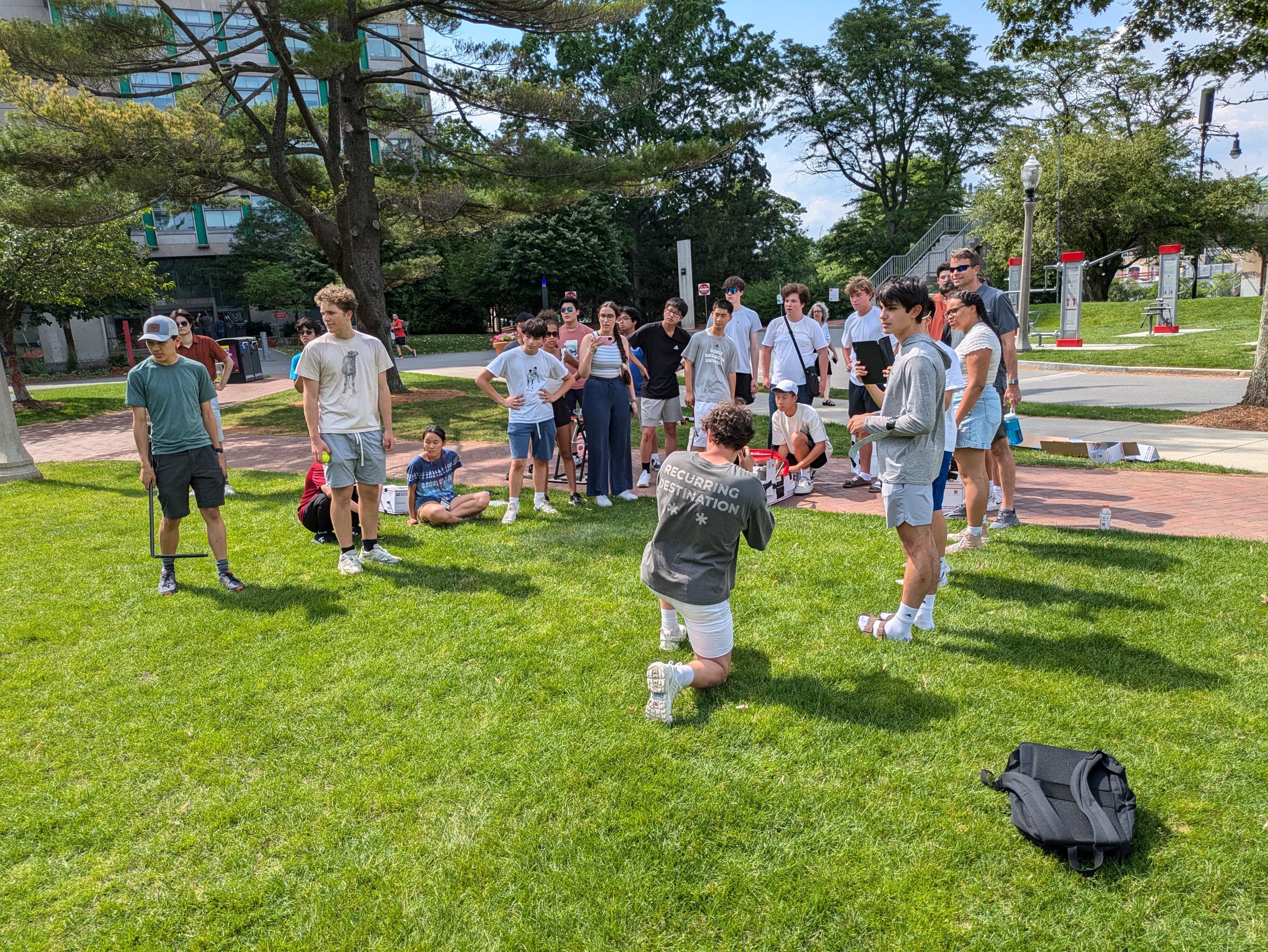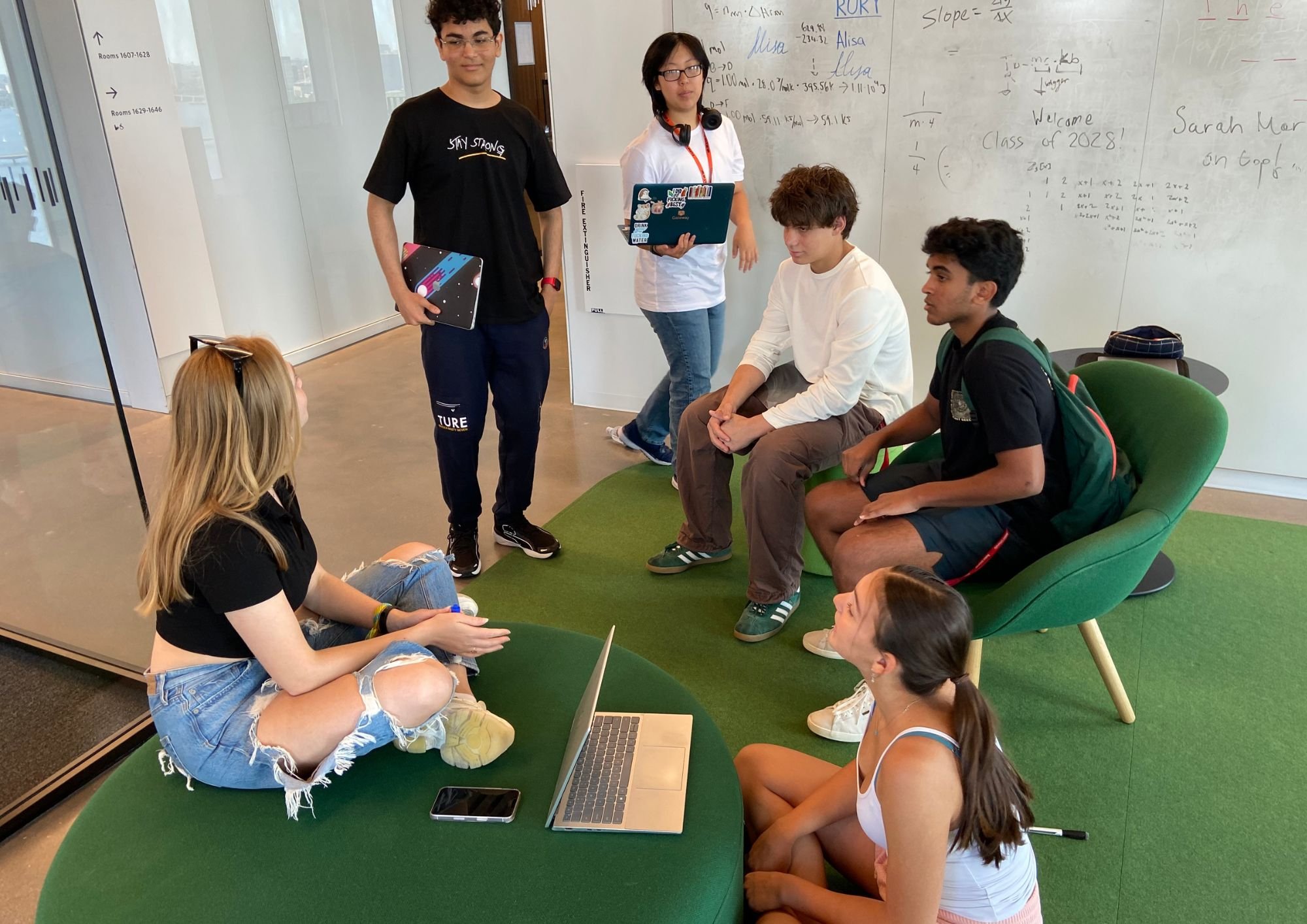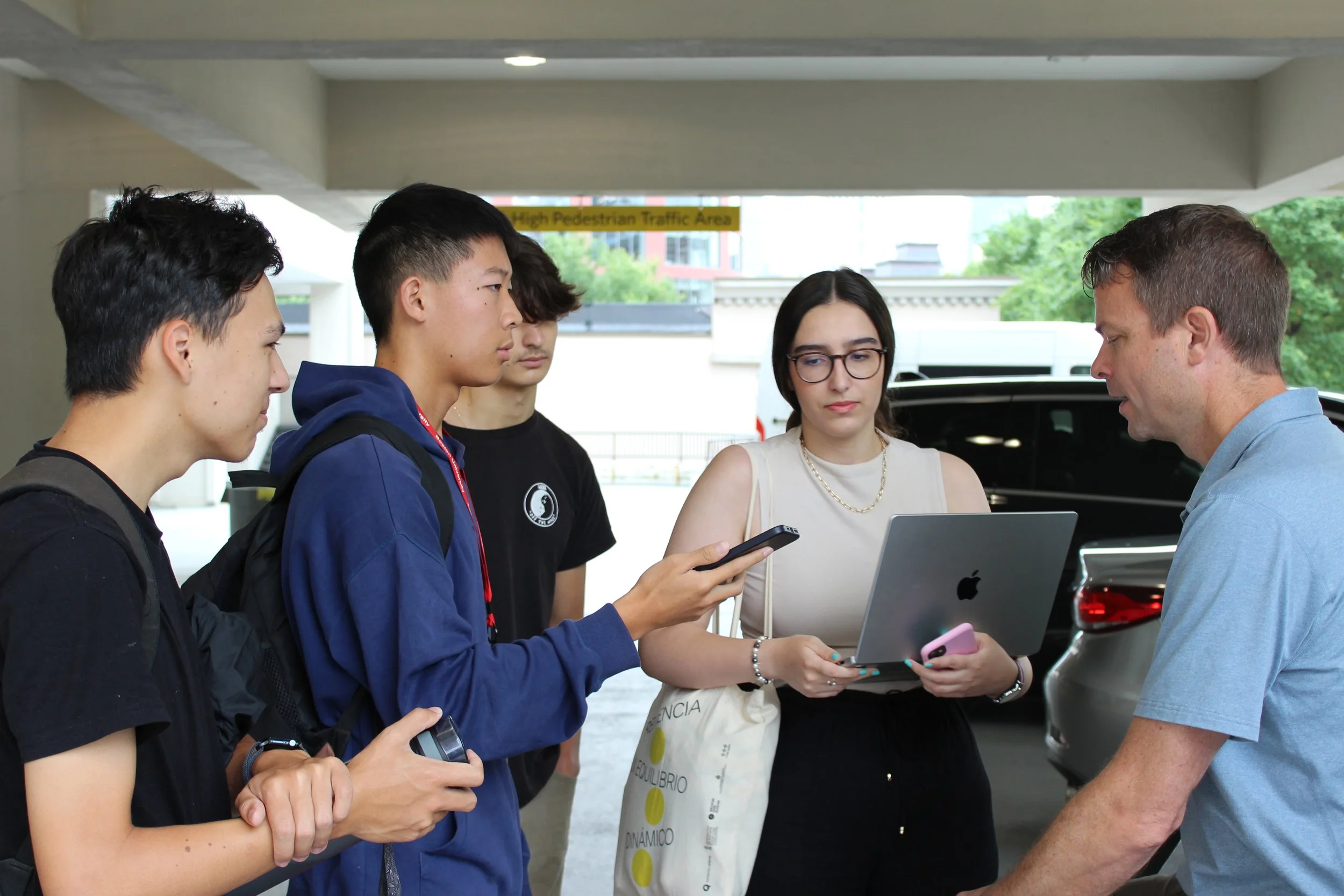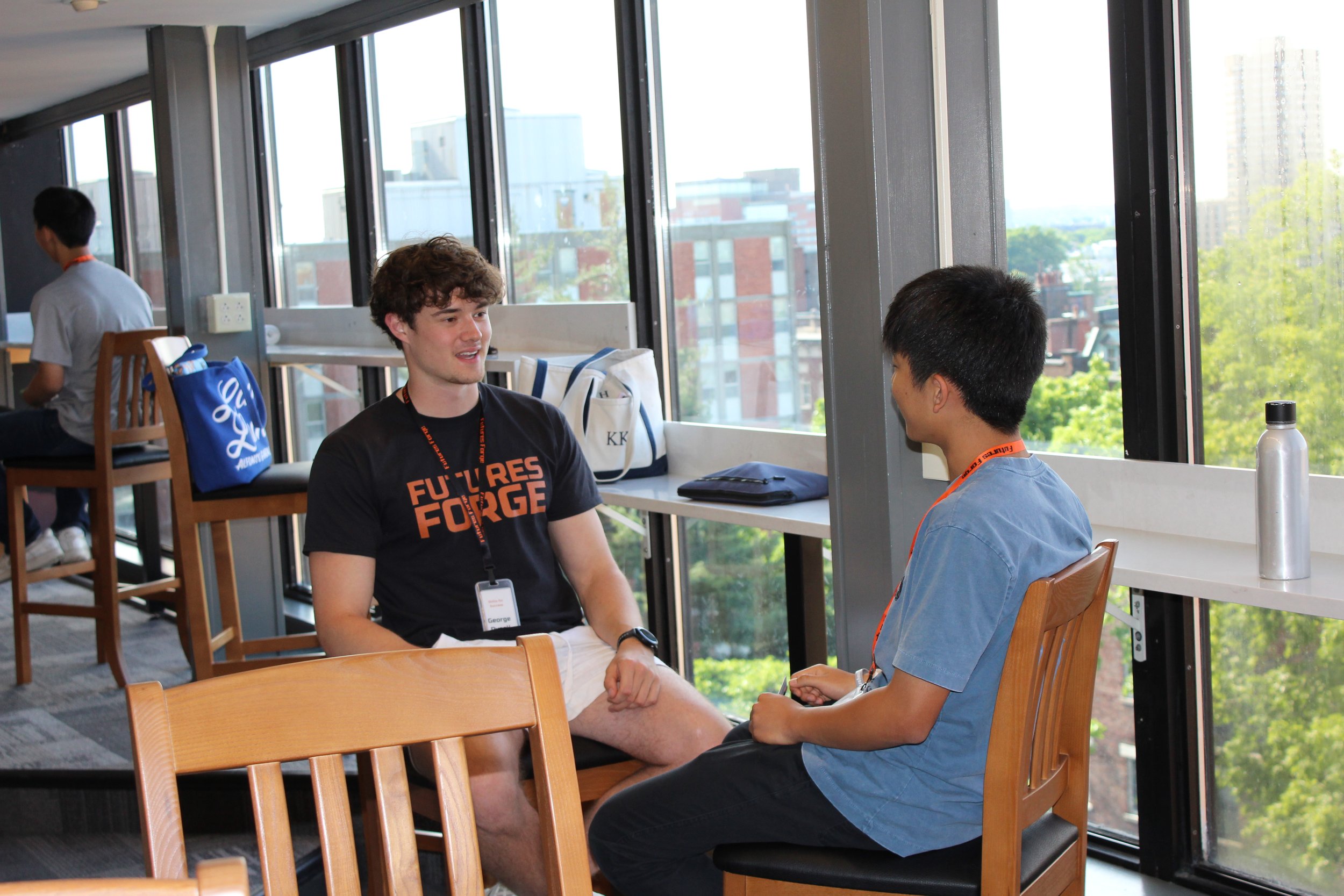
Curriculum

The Futures Forge Curriculum
The Futures Forge core curriculum is devoted to developing in students the attributes and skills they need to thrive in their lives and careers, as well as the tools and paths to develop these skills lifelong.
This curriculum is built entirely on the foundations of a century of academic research and deep engagement with industry. The skills and capabilities that successful entrepreneurs use most are the same that top employers struggle to find, and that futurists see as critical in the future economy. And they are not directly taught in most schooling experiences.
At a practical glance, these attributes and skills roll up into four high-level areas of performance: teamwork, critical thinking, resilience, self-awareness.
The Six Key Attributes
Grit
Personal Integrity
Motivation
Conscientiousness
Adaptability
Emotional Intelligence
The Eight Core Skills
Communication & Presentation
Critical Thinking
Execution
Innovation
Lifelong Learning
Problem Solving
Self-Management
Teamwork

Students do not attend lectures at Futures Forge; we do not exist to transfer knowledge that students can learn themselves online. Instead, we develop and practice new concepts using a series of challenges that integrate concepts in hands-on project work. This cycle, called catalytic learning, is:
A brief intro to a difficult, high-complexity, wide-scope, (typically) novel challenge and key skills that will be useful in tackling it
Self-directed learning and knowledge acquisition with a team of talent peers, with help and guidance from facilitators
Building a plan to execute the challenge
Taking on the challenge in competition with other teams, experiencing cognitive, psychological, and interpersonal “stretch”
Learning through group presentations
Integration through feedback, coaching, reflection
Catalytic Learning
Each challenge or project serves as a focus for learning and an opportunity to integrate and exercise the key attributes and skills. Some of the challenges include:
Competitive building projects
Simulations of business or work situations
Design projects that explore product development and entrepreneurship
Planning real events
And more

Module Structure
In addition to challenges, we run a series of Modules: some help students learn a specific topic, others focus on more deeply developing one or a few key skills. All Modules use our learning approach and integrate reinforcing skills throughout the entire course. Topics of knowledge taught within modules vary from self-discovery and psychology to technical skills, to the use of tools that students will use in their future. Some examples:
Self discovery: Students will learn about their and other personality types, differentiate conscious and subconscious thinking and behaviours, and develop self-awareness of their reactions and emotions.
Technical skills: Students will learn about rapid knowledge acquisition, technical problem-solving, presentation and communication skills, and job-specific skills that they choose.
Tools: Students will learn how to use generative AI, “fierce conversation” and feedback frameworks, and college course load hacking.
The generator build challenge is designed to integrate and practice skills that have been learned during the latter part of the Personal Growth Accelerator. Students will build a power generator using a limited budget and accessible materials, with the goal of generating electricity most efficiently. Some of the skills that will be used during this Challenge include:
Using generative AI to quickly iterate on questions and designs
Giving and receiving great feedback
How to rapidly become experts in new topics
How to influence and persuade others
Ruthlessly prioritizing and managing resources
Solving complex technical problems
Prep for the Challenge will be interspersed throughout other Modules during the week. But the announcement comes with a briefing document that contains two key packets:
Constraints, materials and available tools, and parameters for winning the Challenge
Learning resources that students may want to consider (early Challenges will have more resources provided; later Challenges will require more skillful research)
A Weekly FLC Challenge: Build a Generator
This Challenge will have a fixed cash budget for materials, which students will need to acquire for themselves on a short timeline. The parameters of this challenge: the generator that has the lowest one-week cost per kWh wins. While students dive in, facilitators are socratically asking questions.
What general generator designs do or don’t make sense given the materials at hand, the location, and the tools available? How might they go about ruling some out, or promoting others? Students begin research and iteratively designing on their own initiative, with lots of facilitator support. Facilitators are checking in on progress, giving feedback on dynamics, and helping them learn how they’re working together.
Wednesday is Build Day, and students are out the door before they normally have breakfast, blueprints in hand. Receipts are turned in to account for cost. When construction is done, facilitators begin tracking power production, and measurement continues throughout the week. A winner is announced at the end!
After teardown, the students themselves decide which teams performed best on different axes:
Team dynamics, research, design, and execution (a well-designed generator might have failed due to a loose screw). And each team, of course, presents back:
What design did they choose, and why? Why not another?
What did they learn from working together? About themselves, each other, their work styles?
What did they learn about project management and engineering?
If they were to build a generator again, what would they do differently next time?

Join Upcoming Webinars
Meet founders, facilitators, and alumni at our upcoming webinars this fall. Select below which webinar you want to attend, and you’ll receive an invitation via email.
Early in all Futures Forge courses, students understand their personality and others’, to better understand and appreciate their strengths, blind spots, and how they relate to others and the world. This module is integral to the Course’s broader goal of developing deep self-understanding, autonomous motivation, and alignment between one’s values and one’s work. Students start by reading a briefing document before the first discussion group. The briefing document shares some of the ways that learning about personality types helps, and some of the available resources.
An Example FLC Module: Understanding Your Personality
During the first group discussion, facilitators will guide students with key questions such as:
Share an example of a time you’ve been confused about why someone saw the world so differently from you
Do you think it’s reasonable to try to categorize people into personality types? Why or why not?
What benefits can come from identifying yourself and others with a personality type? What pitfalls?
How might we decide what is a “good” or “credible” system of categorizing people by personalities?
What does it even mean to have a “type?” How deterministic is this, really?
-
After lunch, students are broken into groups. Their task is to find 5 methods of “typing” that they think are powerful and credible, and 5 that they think are not credible. They’ll also be prepared to answer some key questions such as:
What methods are most popular in business, most popular in the mindfulness community?
What are the key criticisms of these different methods you’ve heard?
What makes each method seem “valid” or “invalid” to you?
What would you keep in mind when using the “valid” methods?
Groups present their answers in a few days. After quick constructive feedback on the presentations, the group chooses a personality typing method that they like. They learn deeply about it that morning, and during the afternoon, they all take a personality “test” to find their types, with the following guidance: don’t tell anyone which “type” they received in the test.
Over the next week, each student is to note their guesses about other students’ types. At some point during the next week, all students guess their peers’ types, and the student who got the most correct guesses wins the respect of their fellows, and perhaps a small prize.
Results are discussed: why is it easy or difficult to guess some types and not others? What patterns did you notice? How did it feel to be correctly or incorrectly guessed? Do you feel you might change your behavior? Do you feel more free, or more restricted, by knowing your personality type?
The next day, one more two-minute presentation from each student:
What did I learn from the exercise
What are the implications for myself
What are the implications for working with others
After these presentations, students return to their groups for deep feedback for each other on their presentations and content, and facilitators make sure they’re sharing feedback on how well they are sharing that feedback.
And then next week, we’ll do it all again–with everyone’s second-favorite personality typing method.
Weekly FLC Challenge: The Vietnam Itinerary
This Weekly Challenge focuses on putting students in positions of responsibility and leadership, stretching them with just enough “safety” and support to operate effectively. In this Challenge, students will integrate and practice the following skills:
Rapid knowledge acquisition
Leadership and coalition-building
How to effectively use AI to do your work for you
Critical thinking
Financial management
Creativity and agility
-
A few weeks into the Session in Argentina, students find they are getting more and more involved with the logistics of visiting and living in the country. They’ve learned how to get around. They’ve realized they need to figure out how to speak the language or use technology to rapidly translate it. They need to know about local food, pharmacies, mass transit, money, and mobile phone service ahead of time.
This week’s Challenge puts them in charge of planning the trip to their 3rd location: Vietnam, where the Career Accelerator is held. (Facilitators will, of course, make sure we all get there and back in one piece.)
Students will be given a briefing document similar to what they had for the Bridge-Building Challenge: parameters, constraints, and resources to consider.
Their goal: create the best possible plan to arrive at, work in, enjoy and have fun in, survive, and leave Vietnam without running afoul of local laws and customs, germs, or other pitfalls. While the guest house and other important long-lead-time matters will have been arranged, many of the details will be up to the students themselves.
As groups, they will research how to get everyone there from Boston, and how to get to the guest house near Hanoi, all within budget. They might (or might not) decide that some students will be assigned to learn some Vietnamese to get around. They might decide that everyone should get a “booklet” that they create and print. They’ll pick weekend activities and figure out how to source food for dinner.
They’ll come back together and present to each other their plan and, of course, decide amongst themselves whose plan is best. Feedback on the content, the process, and the presentation style and clarity will be rich.
Finally, as a Section, they’ll choose a Vietnam Trip Planning Committee of 3 members. Those 3 will work with the facilitators to do the work and make the trip happen.
This is one of the ways that we rapidly iterate to scaffold challenging experiences, culminating in large responsibility for our adult students, and one of the many reasons they will emerge from Futures Forge accelerated far beyond their peers.
How Students Learn the Attributes
and Skills
In the video series below, Erik explains how Futures Forge understands some of the key attributes and core skills,
and how we help talented students develop them quickly.
Attributes
Skills
Example Attribute: Learning Emotional Intelligence
Emotional Intelligence (often shortened to “EQ,” which means “Emotional Quotient”) is not synonymous with “empathy,” even though popularly, many seem to to think so. EQ is a bundle of traits and/or abilities that help you navigate the emotional context of yourself and others. Another way of putting it: Emotional Intelligence is “The ability to accurately perceive, assess, and positively influence emotions in oneself and others to promote constructive social interactions and achieve individual or collaborative goals.”
While researchers differ on whether EQ is best described as a set of traits (“trait-based EQ”) or abilities (“ability-based EQ”), they largely agree that emotional intelligence manifests as four factors:
Self-awareness (awareness of one’s own emotions)
Self-management (managing and controlling one’s emotions)
Social Awareness (understanding and being aware of the emotions of others)
Social/Relationship Management (responding to others in ways that are helpful for the relationship)
Trait-Based vs Ability-Based Emotional Intelligence
What’s the difference?
Trait-based EQ (or “Personality-Based”) is based on personality traits and disposition, including empathy, tendency to express one’s emotions, optimism, self-motivation, resilience, tendency to like others, positive mindset, etc.
Ability-based EQ is based on skills that have a “correct answer,” and is generally considered to be teachable. For example, those better able to determine the emotion someone’s feeling based on a facial expression have higher ability-based EQ.
Ability-based EQ is significantly easier to teach because it simply requires teaching certain techniques. Trait-based EQ requires altering one’s attributes, which move more slowly, require hands-on work, and require a significant amount of coaching and feedback. Trait-based EQ, however, has a much clearer positive impact on job performance and career success.
Therefore, we develop both.
Resources to Get Started
Below are some of the resources that we will encourage students to explore at the beginning of their journey at
Futures Forge, to learn the fundamentals of trait-based EQ and the techniques for applying and improving ability-based EQ.
Online courses that we like:
University of Michigan’s “Emotional Intelligence: Cultivating Immensely Human Interactions”
Yale’s “Managing Emotions in Times of Uncertainty and Stress”
UC Davis’s “Emotional and Social Intelligence” primer as part of their “Professional Skills for the Workplace Specialization” which includes other primers we like, on:
Critical Thinking for the Professional
The Growth Mindset
Adaptability and Resiliency
Brief Videos
Strategies to become more emotionally intelligent by Daniel Goleman (10:30)
TEDx, 6 steps to improve your emotional intelligence by Roma Hacker (17:00)
Big Think, “Outsmart Evolution and Master Your Emotions” by Paul Ekman (4:00)
University of California, “The Atlas of Emotions with Dr Paul Ekman and Dr Eve Ekman” (59m)
Academic Papers that helped us understand the concept
Joseph, D. L., & Newman, D. A. (2010). Emotional intelligence: An integrative meta-analysis and cascading model. Journal of Applied Psychology, 95(1), 54-78.
O’Boyle Jr, E. H., Humphrey, R. H., Pollack, J. M., Hawver, T. H., & Story, P. A. (2011). The relation between emotional intelligence and job performance: A meta‐analysis. Journal of Organizational Behavior, 32(5), 788-818.
Miao, C., Humphrey, R. H., & Qian, S. (2018). A cross-cultural meta-analysis of how leader emotional intelligence influences subordinate task performance and OCB. Journal of World Business, 53(4), 463-474.
Books We Like on the Topic
Daniel Goleman, Emotional Intelligence
Travis Bradberry, Emotional Intelligence 2.0
Paul Ekman and the Dalai Lama, Emotional Awareness

















